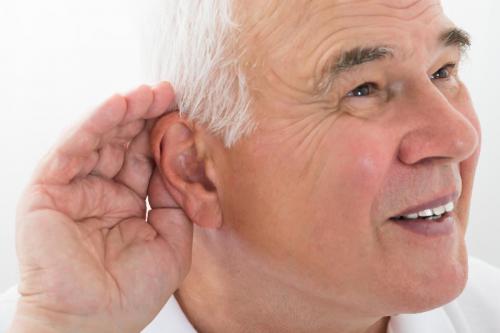Table of Content
Age-related hearing loss is the loss of hearing that gradually occurs in most of us as we grow older. It is one of the most common conditions affecting old adults.
Signs of Hearing Loss
Some people have a hearing problem and don’t realize it.
- Having trouble hearing over the telephone
- Find it hard to follow conversations when two or more people are talking
- Often ask people to repeat what they are saying
- Need to turn up the TV volume so loud that others complain
- Have a problem hearing because of background noise
- Think that others seem to mumble
- Can’t understand when women and children speak to you
Age-Related Hearing Loss (Presbycusis)
Presbycusis, or age-related hearing loss, comes on gradually as a person gets older. It seems to run in families and may occur because of changes in the inner ear and auditory nerve. Presbycusis may make it hard for a person to tolerate loud sounds or to hear what others are saying.
Age-related hearing loss is gradual and usually occurs in both ears, affecting them equally. So someone with presbycusis may not realize that he or she has lost some of his or her ability to hear.
Earlier studies on hearing loss
Previous studies found that hearing loss and mental decline are two common conditions of aging, and also that they may be related. The studies also found that elderly with hearing problems were more likely to develop problems with memory and thinking three years earlier than those with normal hearing.
Approximately one in three people between the ages of 65 and 74 has hearing loss, and nearly half of those older than 75 has difficulty in hearing. But, some people may not want to admit they have trouble in hearing.
For the investigation in the late 1990s, close to 2,000 men and women in their 70s and 80s who took part in the process where hearing was tested for five years and decline in their memory and thinking was assessed for next six years.
The findings revealed that the participants with hearing loss showed evidence of mental declines 30% to 40% faster than the people with normal hearing and those people with severe hearing loss had steeper declines in mental function.
Also a research was done to find if hearing aid could help slowing mental decline. The leading professor of the study said, “Only about 15% of the people who need hearing aids get them.”
“Our findings emphasize just how important it is for physicians to discuss hearing with their patients and to be proactive in addressing any hearing declines over time,” he said.
Latest Study linking hearing problems with other ailments in elderly conducted in Japan
Over 90 percent of hearing loss is age-related and its burden growing in aging population along with worsening their mental, physical and social ailments.
The fourth-leading cause of living with disability in the world is attributed to Hearing loss. People with hearing loss may find it hard to have conversations with friends and family.
A team of Japanese researchers conducted the study on 137723 Respondents aged 65 or older and without dementia for comparisons by examining the three areas viz. mental, physical and social ailments to throw light on the link between hearing loss and other illnesses especially memory loss.
About 9% of these respondents were reported to have hearing loss which would tend to increase with age.
The lead author of the study said, “Japan is the world’s most rapidly aging country, and this is a large and compelling data set of its citizens. It was a solid foundation for examining correlations between hearing loss and other three problems: outdoor activity limitations. Psychological distress, and memory loss.”
The research also refined the analysis by considering other factors such as smoking, alcohol intake and income. And the differences between those with or without hearing loss can’t be ignored.
For outdoor activities such as shopping, 28.9 percent of the respondents with hearing loss were affected as compared to just 9.5% of those without.
For psychological distress, it was 39.7% with hearing loss and 19.3% without it.
The maximum difference was found for memory loss with 37.7% with hearing loss against 5.2% without it.
According to the researchers, hearing loss limits the activities of older people affecting them mentally and physically. It may lead to communication barriers and older people who can’t hear well may become depressed, or they may withdraw from others because they feel frustrated or embarrassed about not understanding what is being said. Because they don’t hear well, they are mistakenly thought to be confused, unresponsive, or uncooperative leading to more stress in them.
How to cope with hearing loss?
- Accept that you have a hearing problem and let people know about it.
- Hearing aids by volunteers can provide them with assistance
- More social support to be given to the older with hearing loss by them asking people to face you and to speak more slowly and clearly. Also, ask them to speak louder without shouting.
Greater awareness of the burden of hearing loss will help improve their quality of life.
.webp)





_1735214375.webp)








